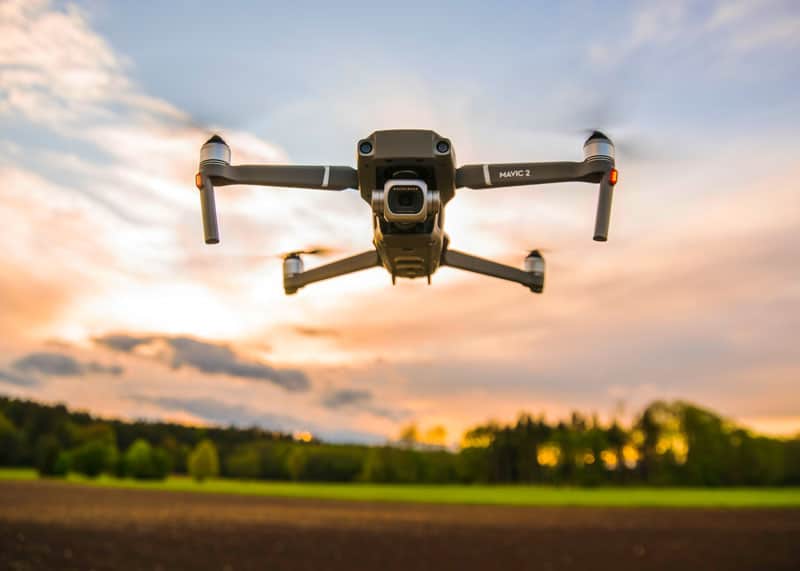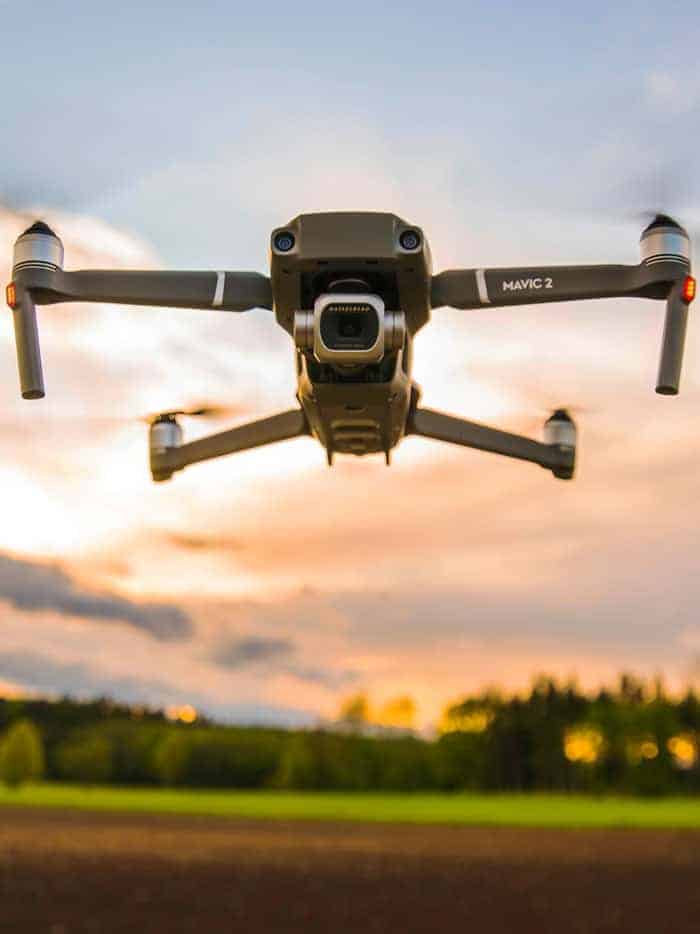Are drones legal in Canada? Yes, but the rules have changed. And new Canada drone laws are planned. Here’s what you need to know about legally flying your drone in Canada. In this post, you’ll learn about the rules and restrictions. Plus lots of resources.

Canadian Drone Laws and Limitations
There are lots of specific rules surrounding drone registration and operation.
Here’s an overview of the rules from Transport Canada.
- Permitted Drone Use: Both recreational and commercial drone use is permitted in Canada.
- Drone Pilot License: Mandatory. Either Basic or Advanced Certification is required. This applies to both Canadian residents and non-residents.
- Drone Registration: Mandatory
- Drone Labeling: Yes, with a registration number from Transport Canada
- Drone Insurance: Not mandatory
Note: Small drones (microdrones) that weigh less than 250 grams (0.55 pounds) are not subject to these laws. These smaller drones can be flown without drone pilot certificates. And they don’t need to be registered either.
A great microdrone option is the DJI Mini 2 and the Mini 3 Pro (they both come in at just 249 grams). Because of its small size, it is exempt from the certification/registration rules.
2 Certification Levels: Basic and Advanced
If you want to fly a drone over 250 grams in weight, you’ll need to be certified by Transport Canada.
There are two levels of certification.
- Basic Operations: Take a 35-question, multiple-choice, online exam. Score 65% to pass. You have 90 minutes to take the exam.
- Advanced Operations: Take a 50-question, multiple-choice, online exam. Score 80% to pass. You have 60 minutes to take the exam.
Learn more about getting a drone license in Canada. Plus I’ll share my experience of taking the exam, and the resources I used.
Basic Canadian Drone Flying Regulations
As a Canadian drone pilot, you are required to follow these rules. These are a summary of the most commonly asked questions.
- Age: Drone pilots must be at least 14 years old (basic operations) or 16 years old (advanced operations).
- Altitude: Fly below 122 metres (400 feet)
- Maintain visual line of sight (VLOS), which means that you must see your drone at all times.
- Restricted Areas: Maintain a minimum distance from airports (5.6 kilometres /3 nautical miles) and heliports (1.9 kilometres / 1 nautical mile). This means that many towns are off-limits because of heliports at the local hospital.
- Avoid emergency operations (forest fires) and advertised events (sports, parades, concerts).
- Avoid bystanders with minimum horizontal distance. Basic options require 30 metres distance, advanced operation certificates allow less distance.
You will require a Special Flight Operations Certificate (SFOC) to fly above 400 metres, at advertised events, or a drone over 25 kg.
Can I fly my drone recreationally in Canada?
Yes, recreational drone use is allowed. The drone must be registered and the operator might require certification. More on this below.
Can I fly my drone commercially in Canada?
Yes, commercial drone use is allowed. The drone must be registered and the operator might require certification. More on this below.
What is the maximum drone flight altitude?
The maximum altitude in Canada is 122 meters (400 feet) above ground level (AGL). If you need to fly above this altitude, you’ll need to apply for an SFOC (Special Flight Operations Certificate).
What are the no-fly zones for drones in Canada?
In Canada, you can’t fly in National Parks, near airports, or near hospitals with helipads. There are numerous registered Aerodromes with restrictions and warnings.
Where can I fly my drone in Canada?
This drone site selection tool by the National Research Council Canada will help you know where you can legally fly. Nav Canada also produces NAV Drone, an app on Android and iOS that displays the same map, with additional details.
Can non-residents fly their drones in Canada?
Yes. Foreign operators can fly drones in Canada. They require an approved SFOC (Special Flight Operations Certificate) for any purpose (recreation, commercial, research). This is in addition to the drone certification and registration requirements for all operators.
Who is a foreign operator? According to Transport Canada, foreign operators include everyone who isn’t a Canadian citizen, permanent resident, or provincial or federally incorporated corporation.
The rules were current at the time of publication. Here are the rules from Transport Canada.
7 Drone Documents to Carry on Every Flight
What documents do I need when I’m out flying? Here are the minimum documents you should always have with you.
- Valid drone pilot certificate: Printed or electronic certificates are accepted.
- Proof of Recency Requirement: If you have had your basic license for 24 months, you’ll need to take this free study program to refresh your knowledge. You are required to carry the completed copy with you.
- Flight Log / Maintenance Log: These log books record both your flight details and the maintenance and repair history of your drone.
- Marked Drone: Make sure to mark your drone with your Transport Canada registration number. You should also carry proof of drone registration.
- Manufacturers User Manual: You need to maintain a copy of the drone manufacturer’s user manual whenever flying your RPAS. This can be paper or digital.
- Checklists: Take-off, landing checklists.
- Emergency contacts: Have contact information for Emergency Services and local authorities. This is important in case of a flyaway (out of control drone) or emergency medical situation.
Here are two additional documents you might require.
- SFOC: (Optional, depending on flight plans). Make sure to have your Special Flight Operations Certificate paperwork on hand if your flight requires this.
- Insurance: If you purchase liability insurance, make sure to have the paperwork, including who to contact in case of an incident.
For drone pilots flying micro drones (under 250 grams), these aren’t legal requirements.
Drone Acronyms and Definitions
These are common expressions and acronyms you’ll find in the Canadian drone industry.
- AGL: Above ground level
- Microdrone: Refers to drones that weigh less than 250 grams.
- PIPEDA (Personal Information Protection and Electronic Documents Act). This Canadian legislation controls data collection, storage, and distribution.
- RPAS: Remotely Piloted Aircraft System
- SFOC: Special Flight Operations Certificate. This certificate is issued by Transport Canada and is used to manage use cases outside of the standard drone applications.
Other words for drones: UAS, RPAS, UAV, MAV, sUAS, quadcopter. The uses of these terms vary depending on the country and application of the unit.
Hungry for more? Check out our Drone Pilot Glossary
Fines and Penalties in Canada
Aside from the obvious moral and legal implications to breaking the rules, you could also be facing fines and/or jail if you break the rules.
As you might expect, these penalties can compound, if you break more than one rule, even on the same flight. It wouldn’t be hard to see fines of $10,000+ for careless flying.
Individual Fines and Penalties
You can be fined up to $1,000 for:
- flying without a drone pilot certificate
- flying unregistered or unmarked drones
- flying where you are not allowed
And you can be fined up to an additional $3000 for:
- putting aircraft and people at risk
Corporations Fines and Penalties
You can be fined up to $5,000 for:
- flying without a drone pilot certificate
- flying unregistered or unmarked drones
- flying where you are not allowed
And you can be fined up to an additional $15,000 for:
- putting aircraft and people at risk
Privacy Laws in Canada
While Transport Canada regulates the training and registration of drones and operators, we are still responsible for the personal information we collect.
Commercial drone operators must follow PIPEDA (Personal Information Protection and Electronic Documents Act). This applies in all provinces except Alberta, BC, and Quebec. If you operate entirely within one of these provinces, the PIPEDA doesn’t apply. Each of these provinces has its own privacy laws to manage personal information.
Here’s more about privacy concerns for drone operators in Canada.

These rules are essential for content creators whose vlogging equipment often includes drones.
More reading: Guide to GoPro Drones
Your Turn
Have a question or addition to this guide about Canadian drone laws? I would love to hear from you. We want this to be the best resource available.
- About the Author
- Latest Posts
Hey, I’m Bryan! I’m a content creator and co-founder of Storyteller Tech.
Experienced GoPro Videographer: I’ve been shooting with GoPro cameras for over 11 years. My first GoPro was the Hero3 Silver, bought for a Galapagos work trip in 2012. Today I own 20+ action cameras, including GoPro, DJI, and Insta360 cameras.
Professional Creator: Dena and I have developed video and content marketing plans for numerous international travel brands. And we also run several content businesses.
Bryan also creates at Storyteller.Travel and is co-founder of Storyteller Media, a Canadian-based publishing company.
